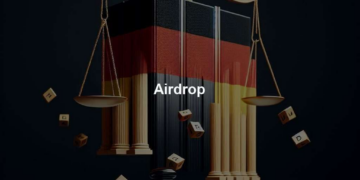No products in the cart.
Introduction
In the cryptocurrency world, an airdrop is a term used to describe the distribution of a certain amount of cryptocurrency tokens or coins to a large number of wallet addresses. Airdrops are often used as a marketing strategy to raise awareness for a new project or expand the user base of a cryptocurrency. In this article, we will explore the concept of airdrops, consider their legal significance, and discuss the legal challenges they present.
Key Facts
- Airdrop is the distribution of cryptocurrency tokens to many wallet addresses.
- Often used to promote new projects or to expand the user base.
- Legal classification varies internationally and can be complex.
- In the US, an airdrop could be considered a security if it passes the Howey test.
- Tax treatment of airdrops is often unclear, as income or as capital gains.
- Airdrops may be subject to AML and KYC regulations for identity verification.
- Data protection is important; personal information must be protected in accordance with data protection laws.
What is an airdrop?
An airdrop is essentially a distribution of cryptocurrency tokens or coins. This is usually done automatically and is often distributed to users who already own a particular cryptocurrency. For example, a blockchain project might decide to distribute 10% of its tokens to users who already own Bitcoin.
Airdrops can be performed for a variety of reasons, including:
- Promoting a new project or cryptocurrency.
- Rewarding loyal customers.
- Creating a broader user base for a cryptocurrency.
Legal significance
The legal classification of airdrops is complex and varies from country to country. In some countries, tokens distributed through an airdrop could be considered securities, meaning they would be subject to securities laws.
In the U.S., for example, an airdrop could be considered a security if it passes the Howey test, a test used to determine whether a particular transaction can be considered an investment. If so, companies conducting the airdrop might have to register with the Securities and Exchange Commission (SEC) and comply with certain disclosure requirements.
Legal challenges
Control
One of the biggest legal challenges with airdrops involves taxes. In many countries, it is unclear how airdrops should be taxed. In some jurisdictions, they might be considered income, while in others they might be considered capital gains.
Anti-Money Laundering (AML) and Know Your Customer (KYC)
Airdrops could also fall under AML and KYC regulations. This means that companies conducting airdrops may be required to verify the identity of recipients and ensure that tokens are not used for illegal activities such as money laundering.
Securities Laws
As mentioned above, airdrops could be considered securities in some countries. This would mean that they would be subject to certain registration and disclosure requirements. Companies that conduct airdrops must therefore be careful to ensure that they do not violate securities laws.
Privacy
Because airdrops often require users to disclose personal information in order to participate, there are also privacy concerns. Companies must ensure that they comply with data protection laws and protect users’ personal data.
Conclusion
Airdrops are a popular method in the cryptocurrency world to raise awareness for a new project or expand the user base of a cryptocurrency. While they can offer many benefits, there are also a number of legal challenges that must be considered. Companies that conduct airdrops must be aware of the legal framework and ensure that they comply with all applicable laws and regulations.





















